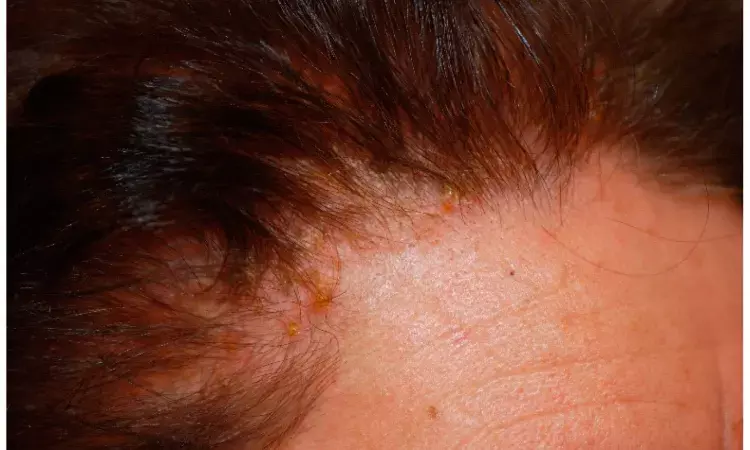- Home
- Medical news & Guidelines
- Anesthesiology
- Cardiology and CTVS
- Critical Care
- Dentistry
- Dermatology
- Diabetes and Endocrinology
- ENT
- Gastroenterology
- Medicine
- Nephrology
- Neurology
- Obstretics-Gynaecology
- Oncology
- Ophthalmology
- Orthopaedics
- Pediatrics-Neonatology
- Psychiatry
- Pulmonology
- Radiology
- Surgery
- Urology
- Laboratory Medicine
- Diet
- Nursing
- Paramedical
- Physiotherapy
- Health news
- Fact Check
- Bone Health Fact Check
- Brain Health Fact Check
- Cancer Related Fact Check
- Child Care Fact Check
- Dental and oral health fact check
- Diabetes and metabolic health fact check
- Diet and Nutrition Fact Check
- Eye and ENT Care Fact Check
- Fitness fact check
- Gut health fact check
- Heart health fact check
- Kidney health fact check
- Medical education fact check
- Men's health fact check
- Respiratory fact check
- Skin and hair care fact check
- Vaccine and Immunization fact check
- Women's health fact check
- AYUSH
- State News
- Andaman and Nicobar Islands
- Andhra Pradesh
- Arunachal Pradesh
- Assam
- Bihar
- Chandigarh
- Chattisgarh
- Dadra and Nagar Haveli
- Daman and Diu
- Delhi
- Goa
- Gujarat
- Haryana
- Himachal Pradesh
- Jammu & Kashmir
- Jharkhand
- Karnataka
- Kerala
- Ladakh
- Lakshadweep
- Madhya Pradesh
- Maharashtra
- Manipur
- Meghalaya
- Mizoram
- Nagaland
- Odisha
- Puducherry
- Punjab
- Rajasthan
- Sikkim
- Tamil Nadu
- Telangana
- Tripura
- Uttar Pradesh
- Uttrakhand
- West Bengal
- Medical Education
- Industry
Hormones may have therapeutic potential to prevent wrinkles, hair graying: Study

Hormones may be leveraged to treat and prevent signs of aging such as wrinkles and hair graying, according to a new study published in the Endocrine Society journal Endocrine Reviews.
Until now, only a limited number of hormones, mainly topical retinoids (retinol and tretinoin) and estrogen which is typically used to treat side effects of menopause, have been used in clinical practice as anti-skin aging compounds. This study reviews a new class of hormones and their anti-aging properties.
“Our paper highlights key hormone players that orchestrate pathways of skin aging such as degradation of connective tissue (leading to wrinkling), stem cell survival and loss of pigment (leading to hair graying),” said lead author Markus Böhm, M.D., of the University of Münster in Münster, Germany. “Some of the hormones we studied have anti-aging properties and may be used in the future as agents to prevent skin aging."
The skin is the largest organ and undergoes both intrinsic (chronological) and extrinsic aging which is caused by environmental factors such as sun exposure.
“Skin is not only a target for various hormones that control pathways of skin aging but itself is certainly the largest and richest site for hormone production besides classical endocrine glands,” Böhm said.
To better understand the connection between hormones and skin aging, the researchers studied the pivotal hormones controlling skin aging, including insulin-like growth factor 1, growth hormone, estrogens, retinoids and melatonin. Melatonin is especially interesting as a potential anti-skin aging substance as it is a small molecule, inexpensive, well-tolerated and a direct and indirect antioxidant as well as a regulator of mitochondrial metabolism. Some of the studied hormones, moreover, have astonishing and unexpected biological effects on skin function and hair aging as highlighted by distinct genetic deficiency syndromes.
They also reviewed the emerging roles of additional endocrine players, including α-melanocyte-stimulating hormone (responsible for skin pigmentation), members of the hypothalamic-pituitary-thyroid axis, oxytocin, endocannabinoids (found in CBD products) and peroxisome proliferator-activated receptor modulators and found they have very promising effects, e.g. on UV-induced genotoxic stress crucially involved in the development of photoaging and pigment synthesis within skin and hair.
“Further research into these hormones may offer opportunities to develop new therapeutics for treating and preventing skin aging,” Böhm said.
Other study authors are Agatha Stegemann and Konrad Kleszczyński of the University of Münster; Ralf Paus of the University of Miami Leonard M. Miller School of Medicine in Miami, Fla., the University of Manchester in Manchester, U.K., and CUTANEON – Skin & Hair Innovations in Hamburg & Berlin, Germany; and Pallab Maity, Meinhard Wlaschek and Karin Scharffetter-Kochanek of Ulm University in Ulm, Germany.
The researchers received funding from the Deutsche Forschungsgemeinschaft, the University of Miami Leonard M. Miller School of Medicine, the International Graduate School in Molecular Medicine Ulm, and the Medizinische Fakultät, Universität Ulm.
Dr Kamal Kant Kohli-MBBS, DTCD- a chest specialist with more than 30 years of practice and a flair for writing clinical articles, Dr Kamal Kant Kohli joined Medical Dialogues as a Chief Editor of Medical News. Besides writing articles, as an editor, he proofreads and verifies all the medical content published on Medical Dialogues including those coming from journals, studies,medical conferences,guidelines etc. Email: drkohli@medicaldialogues.in. Contact no. 011-43720751


